Stay in the know on all smart updates of your favorite topics.
To keep Amsterdam liveable the municipality collaborates with its citizens. On average Amsterdam’s population grows with 10.000 people a year. This small big city has a density of 5065 people per square km, over 180 different nationalities. 19% of the total Dutch GDP is earned in the Amsterdam Metropolitan Area. Between 2015 and 2016, the amount of tourists in Amsterdam increased by 7%. To keep Amsterdam’s 162 canals, monumental centre and residential areas liveable, innovative initiatives are required. Share your innovative concepts and ideas here!
The Amsterdam Hunger Game

Learn with the case study Amsterdam to anticipate future food disruptions. Understand the city's food supply chain vulnerabilities is critical for enhancing food resilience. Enhance food resilience in empowerment of people in urban food growing.
Toekomstverkenning publieke platformen

Wat is de impact van (platform)technologie op de overheid van de toekomst en haar rol in de (door o.a. technologie) veranderende samenleving? Wil jij de toekomst tastbaar en beeldend maken en meedoen met een groeiende beweging van jonge (t/m 35 jaar) visionairen, denkers en doeners?
Doe dan mee aan de toekomstverkenning publieke platformen georganiseerd door FUTUR en Provincie Zuid-Holland en ondersteund door Scape Agency.
Vanuit verschillende thematische invalshoeken gaan we hiermee aan de slag in groepen van ongeveer 10 jonge professionals vanuit verschillende organisaties (Publiek, privaat en kennis). Een beschrijving van de eerste thema’s vind je hieronder:
Thema's
- Circulair 2050 - De ambitie om in 2050 niet alleen klimaatneutraal, maar ook nog eens onze economie 100% circulair in te richten, vergt een omslag in denken en doen. Hoe buigen we lineaire ketens rond? Waar beginnen we? En cruciaal: welke rol speelt het publieke platform in deze transitie?
- Zicht op maatschappelijke vraagstukken met data – Data is onmisbaar voor het oplossen van maatschappelijke vraagstukken. Hoe zetten we data verantwoord in voor het benutten van deze kansen?
-Digitale Waterschappen – Bestuurt AI in 2050 het waterbeheer, of wordt water juist lokaal beheert?
-Ambtenaar van de toekomst – Als steeds meer taken worden overgenomen door (platform)technologie, wat is dan de rol van de ambtenaar van de toekomst en welke vaardigheden worden gevraagd?
- Participatie – hoe kan de overheid betrokkenheid van inwoners, bedrijven en maatschappelijke organisaties vormgeven bij beleid en besluitvorming?
- Uitvoering van de toekomst – De meeste publieke dienstverleners leveren een stand van de uitvoering aan. Hoe moet de uitvoering en publieke dienstverlening van de toekomst worden vormgegeven?
- Online leefwereld van jongeren – Welke publieke waarden moeten vooropstaan op social media, hoe ziet een dergelijk platform eruit en welke digitale vaardigheden van jongeren zijn cruciaal?
- Tomorrows Governance – hoe verandert de rol, organisatie en wijze van samenwerken van de overheid?
- Mobiliteit en Brede Welvaart - Wat is de impact van (platform)technologie op de bijdrage van mobiliteit aan de brede welvaart van mensen door de bereikbaarheid van banen, voorzieningen en sociale contacten in de stad, en de regio?
- Sociaal Domein – Hoe kan platformtechnologie bijdragen aan de complexe problemen in het sociaal domein? Hoe ga je toe naar een overheid die er voor de inwoner is, in plaats van de inwoner van het kastje naar de muur stuurt.
- Ethiek
Zijn een van die thema's iets voor jou? Meld je dan aan via: https://kennislab.typeform.com/to/MRNbvgIl
Wat betekent meedoen?
- Je sluit je aan bij een themagroep. En doet mee in de voorbereiding, dus het verzamelen van voorbeeldcases uit eigen werk, rapporten, studies, literatuur, films enz.
- Je doet op 13 februari mee met de visiedag (09:00 - 13:00), en bij voorkeur ook de aansluitende verbeeldingsdialoog in het Provinciehuis van de Provincie Zuid-Holland in den haag. Op deze dag werken de themagroepen met ondersteuning van ontwerpers en kunstenaars hun toekomstbeeld uit.
Je bent in maart beschikbaar voor 1 digitale of fysieke sessie voor de verdere uitwerking van het toekomstbeeld.
- Je bent op 4 april aanwezig (vermoedelijk enkel de middag) bij het slotevent ‘publieke platformen’ georganiseerd door de provincie Zuid-Holland in het provinciehuis. Op 4 april ‘exposeren’ de groepen hun toekomstbeeld aan een breder publiek, en wordt er op verschillende manier een dialoog georganiseerd tussen bezoekers, experts en bestuurders.
- Je vergroot je netwerk, je doet inspiratie op voor de vraagstukken waar jij dagelijks mee bezig bent en je hebt vooral plezier.
Knowing Cotton Otherwise - Flipping the Script
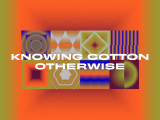
Cotton is perhaps the world's most well-known fabric, however, many stories behind cotton are lesser known. These untold and sometimes unexpected perspectives have been collected and brought together in the exhibition, Knowing Cotton Otherwise.
In the third and final chapter, Flipping the Script, designers Nsimba Valene Lontanga and Angelo Carlos Marcus Elizabeth take you on a journey through their heritage and culture while challenging you to reimagine fundamental concepts within the realm of fashion and design.
The exhibition unpacks and brings into question established ideas of 'classic' and 'basic' style staples, as well as redefining 'typically African' design and print. What happens when we reconsider our preconceived ideas of what cotton represents around the world?
Knowing Cotton Otherwise is open to the public until 16 October 2023 at the Fashion for Good Museum, Rokin 102, Amsterdam.
Knowing Cotton Otherwise

Exhibition Knowing Cotton Otherwise
Cotton is perhaps the world's most well-known fabric, however, many stories behind cotton are less known. These untold and sometimes unexpected perspectives have been collected and brought together in the exhibition, Knowing Cotton Otherwise. Centred on collectivity and community, local artists have been invited to present work that connects and intersects with different themes relating to the story of cotton. By mixing styles and stories, Knowing Cotton Otherwise creates a multifaceted experience, inviting you to reflect, question, play and wonder.
Fashion, art and social change
Built around different themes telling the story of cotton, the exhibition highlights the relationship between cotton and the fashion industry, the role of cotton in an increasingly intertwined web of global cultures, and the sustainable innovations driving its circular transformation. The exhibition provides questions such as where does cotton come from? How is it grown? What is the future of cotton and the role of innovation? How should we relate to the more questionable aspects of cotton, from its history of forced migration to more modern-day challenges? And how can we celebrate cotton, the connections it creates and the opportunities around it?
Collectivity and Community
Knowing Cotton Otherwise is presented in different phases throughout the year in which the exhibition grows and changes. The first phase features artists Benoît Gilles Michel, Caithlin Courtney Chong, Mario Gonsalves, Niño Divino, Noah Cohen, Nsimba Valene and Tasio Bidegain as well as the collectives OSSO Archive, Studio Papa and The Gang is Beautiful. The exhibition also showcases innovative technologies in material traceability and dyeing from Fashion for Good Innovators Oritain and Officina39. Knowing Cotton Otherwise invites you to question the content presented, examine your ideas and engage together in a process of self-reflection and critical consideration.
Interactive installation about sensors in the smart city

Discover how sensors make Amsterdam a smarter city. What measurements are taken and how is data being collected?
The Responsible Sensing Lab created the interactive installation Senses of Amsterdam that is currently exhibited at the public library of Amsterdam (OBA) location Slotermeer! Read more about this project on our website: https://responsiblesensinglab.org/news/senses-of-amsterdam-exhibited-at-oba-slotermeer
After traveling from NEMO Science Museum to Arcam, Senses of Amsterdam can now be visited free of charge at Slotermeerlaan 103E from Tuesday until Saturday.
The exhibition at OBA Slotermeer ends on 25 September 2022. Grab your chance!
Study Excursion: Trends and Innovation in Amsterdam’s Cycling Infrastructure
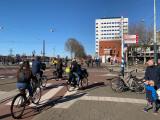
The excursions are delivered as a partnership between the Urban Cycling Institute (UCI) and Bicycle User Experience (BUX).
This two hour excursion brings you to key innovation sites in the central core of Amsterdam, starting at the Nieuwmarkt square in the city center, and ending at the Rijksmuseum. We curate stops at select sites that are representative of broader trends taking place in the city. We discuss changing directions of how the city views cyclists and the street, we show you best practices and- most importantly 😉 – we promise to challenge your preconceptions of how to plan for a cycling city. At the end, we provide different avenues for continued engagement and learning with us.
The study excursions take place from 16:00-18:00 most Saturdays in July and August*. The cost is €50 per person. There are 15 open spots per excursion. Participants need to arrange their own bicycle to take part.
Dates: July: 23, 31*(July 31st is a Sunday)
August: 6, 13, 20, 27
For full information and sign-up, visit the following link:
Expo: "Fashion Week: A New Era"
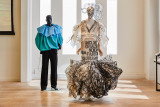
The expo: 'Fashion Week: A New Era' celebrates fashion through the years and explores how this phenomenon developed over time. How does the event influence the fashion industry? And what does the future hold for fashion week?
Every year during Fashion Week the latest fashion is shown on catwalks in Paris, Milan and New York and other metropoles across the globe. This iconic event has a major impact on the fashion industry and on our own wardrobes. In 'Fashion Week: A New Era', the Fashion for Good Museum unpacks the Fashion Week, delving into its past, present and future. View historic looks from the runways of Balenciaga, Versace, Moschino and many more; discover the innovative work of Dutch fashion designer Ronald van der Kemp and digital fashion house The Fabricant.
Responsible Sensing Lab op Arcam tentoonstelling Private_Eye_Butler_Spy

Afgelopen week is de tentoonstelling Private Eye Butler Spy geopend in Arcam. Hier zijn prototypes van 3 projecten van Responsible Sensing Lab te zien, een samenwerking van AMS Institute en gemeente Amsterdam. De tentoonstelling onderzoekt de impact van technologie in en rondom het huis.
De tentoonstelling
Toepassingen in en rond het huis worden steeds intelligenter: in plaats van een huissleutel bepalen toegangssystemen aan de hand van biometrische data of een deur opengaat. In de stad controleren scanauto’s of parkeergelden zijn betaald en registreren sensoren de drukte op straat of de luchtkwaliteit. De tentoonstelling Private_Eye_Butler_Spy onderzoekt de veranderende relatie tussen technologie en de mens. Aan de hand van verschillende thema’s verkennen bezoekers welke ethische vraagstukken en ontwerpopgaven een high-tech-toekomst met zich meebrengt.
Bezoeken
Private_Eye_Butler_Spy is gratis te bezoeken van 12 maart t/m 26 juni 2022 bij Arcam aan de Prins Hendrikkade 600.
Take a virtual tour of eco-hub de Ceuvel

At de Ceuvel we host private tours for interested individuals, schools, companies and other parties. Whether you’re an architect, technical engineer, a high school student, or just a generally interested person: there will be someone at de Ceuvel that can explain our story in a way that’s relevant to your background.
The tour covers the story of De Ceuvel. You will learn about sustainability & the circular economy, urban renewal strategies, architecture and communal experimentation and bottom-up development.
Our virtual tour of de Ceuvel was developed during the corona lockdown. Instead of physically visiting our site, we can show you around virtually! The online tour, or webinar, is conducted in a Zoom meeting. Our guide welcomes you in this virtual environment at a time and date of your convenience. Using photos, exclusive videos and illustrations unavailable elsewhere, we tell the story of our unique site. There will be ample time for questions and conversations with the live tour guide.
The virtual tour can be given to a large group of Zoom participants, or as a remote speaker during a physical event. It is suitable in various contexts: as a guest lecture for schools or universities, as a program item of an (online) sustainability conference, as part of a more extensive (company) training course, or in whatever setting you've designed.
TechLab
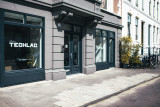
Located in the Plantage area of Amsterdam, a new exhibition space featuring cool new innovations in technology has recently opened.
The gallery space contains many exhibits dedicated to augmented reality, virtual reality, artificial intelligence, 3D printing and robotics. Each station is interactive and playful, ensuring visitors will have fun while learning about these various technologies.
Based around the theme of sustainability, the space shows how we can use technology as a resource to improve not only our lives but our world. Be sure to check out this unique educational tech gallery!
THE YIMBY EXPERIENCE!
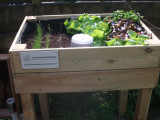
THE YIMBY Yes-In-My-Back-Yard EXPERIENCE! is a bottom-up movement aiming at small scale food growing in cities. THE YIMBY EXPERIENCE! started in 2013 in the city of Arnhem in the Netherlands. The YIMBY EXPERIENCE! is expanding with the support of the city of Arnhem and local sponsors.
Eight years of THE YIMBY EXPERIENCE! shows the empowerment of citizens.: Citizens who started with a small food platform have grown to larger urban food growers. Citizens are more aware of the relation between season and growing and adapt their buying of seasonal food in the supermarket. Citizens gained green growing knowledge and have more green connections in their neighbourhood.
Interested? Take a look at the following YouTube film (2 minutes)
https://youtu.be/0_JWmuhwyR4
Green Urban Living Lab Arnhem

The Green Urban Living Lab Arnhem provides a innovative, cooperative learning and co-creating enviroment, in which multiple stakeholders jointly test, develop and create green metropolitan solutions.
Amsterdam Urban Living Labs
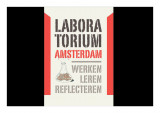
Policy innovation through collaboration between private, public and civic partners together with knowledge institutions is increasingly seen as the best way to address complex urban challenges. One way to this is through so called “Urban Living Labs” where residents, companies, governments, students and researchers collectively tackle metropolitan problems by immersing themselves in the solution as it is being developed. What are the benefits and pitfalls of these types of living labs? In this session we share the experience and lessons accumulated by Amsterdam University of Applied Sciences with innovating through Urban Living Labs and provide specific examples and lessons learned from several projects in Amsterdam.
Policy innovation through collaboration between private, public and civic partners together with knowledge institutions is increasingly seen as the best way to address complex urban challenges. One way to this is through so called “Urban Living Labs” where residents, companies, governments, students and researchers collectively tackle metropolitan problems by immersing themselves in the solution as it is being developed. What are the benefits and pitfalls of these types of living labs? In this session we share the experience and lessons accumulated by Amsterdam University of Applied Sciences with innovating through Urban Living Labs and provide specific examples and lessons learned from several projects in Amsterdam.
Innovation Tour at Johan Cruijff ArenA
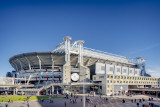
Our Innovation Tour will take you into the World of Innovations.
The Johan Cruijff ArenA is a host Stadium for the UEFA EURO 2020 and is one of the most Innovative and Sustainable Stadiums in the world. A Stadium is a place where people come together, for Leisure, Business or Sports. The Johan Cruijff ArenA is a mulitfunctional building that, with thousands of visitors at once, becomes a small, smart city during events. This makes the Johan Cruijff ArenA a perfect place for Innovation; the Stadium of tomorrow.
Our Innovation Tour will take you into the world of Innovations. we will show you how we've achieved becoming a sustainable, innovative stadium together with our partners.
During the Tour we will answer the following questions;
- How do we create the best fan Experience?
- How do we manage an event day with 55.000 people visit ArenA?
- How do we get 55.000 people safe and, secure in and out the ArenA?
- How do we use batteries from second hand cars for our energy?
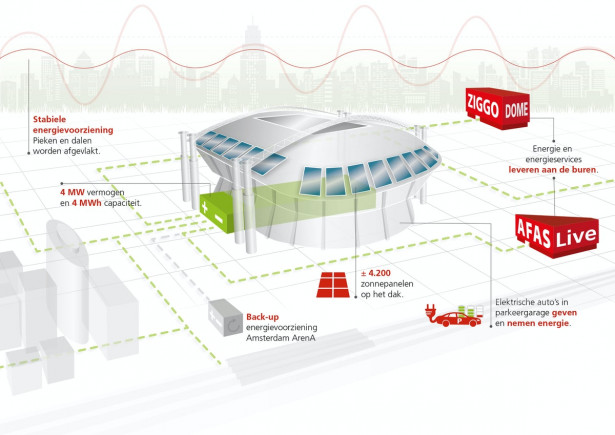
[DISCONTINUED] Amsterdam Innovation Tour (self-guided via app)
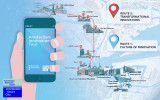
The app is designed to help international delegates and local city users experience some of Amsterdam’s innovative approaches and solutions for smart and sustainable urban development.
During the 2018 We Make The City innovation festival, Amsterdam Smart City and the City of Amsterdam released an app-based, self-guided innovation tour which is now available via the Apple Store and Google Play.
The app is designed to help international delegates and local city users independently experience some of Amsterdam’s innovative approaches and solutions for smart and sustainable urban development.
There are two routes to choose from, both starting from Central Station.
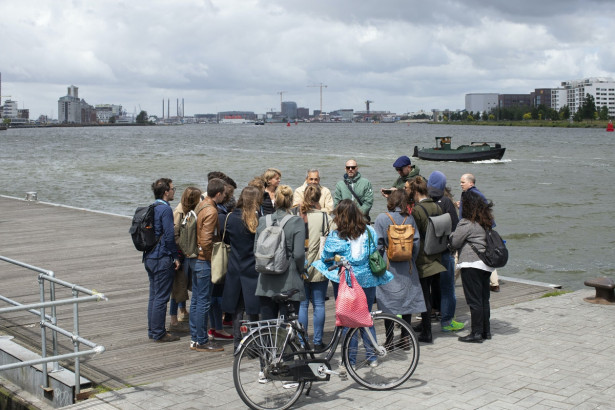
© Thomas Schlijper
The first route “Culture of Innovation” takes users on a two-kilometer walk along Oosterdokseiland development to Marineterrein, the former navy base that is being converted to innovation district. The second route, “Transformational innovations” leads users through Amsterdam North to De Ceuvel living lab and finishes at NDSM-wharf.
<em>App download</em>: Apple Store and Google Play
Amsterdam Innovation Trail
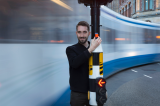
Learning from the places you visit and directly applying this to your own challenges
Featured photo: Anke Teunissen - Smart Bricks CC BY <https://www.flickr.com/photos/maakjestad/40860380292/>
The Amsterdam Approach is famed for creating a comprehensive innovation ecosystem for addressing urban challenges. As the former European Capital of Innovation, Amsterdam aims to create a level playing field in which the municipality, corporations, knowledge institutions and citizens collaborate for innovation. But how do we actually do that in Amsterdam?
Social innovation-think tank Kennisland and design research agency STBY observed how many curious visitors are struggling to learn and benefit from the Amsterdam Approach. Translating the experiences and lessons to their own context proves to be difficult for many international delegations and organisations that are keen to learn. Therefore, Kennisland and STBY designed the Innovation Trail, aimed at learning from the places you visit and directly applying this to your own challenges. We help you to understand what you are going to do differently the moment you get back home, and how you are going to do it.
For many of the complex challenges that cities and societies face there are no easy answers. Luckily, there are many examples of people and organisations that have overcome struggles by creating new opportunities to address complex challenges and simply trying things out. We help you to learn from them, and apply your insights to your own organisation or initiative, using three principles:
- Go where the action is. To learn from innovation approaches, you need to understand the context it is happening in and the people who are creating breakthroughs. Being innovative means broadening your perspective and going beyond your usual limits. We get you there with visits to social innovators around Amsterdam who broken through limits too.
- Learn and reflect in context. Understanding the action is your next goal. Our guidance helps you to reflect on how other people innovate, and draw your own lessons from that. We create tools for you based on, for instance, the Experience Tour tool and Problem Definition tool, to work systematically and apply lessons to your own work immediately.
- Tailor the Innovation Trail. Whether you are an industry, government or NGO delegation, whatever phase of the innovation spiral you are in with your work, we will customise your trail to allow for the learning goals you have. We can help you reframe problems, explore opportunities, and even aim for systemic change.
The Amsterdam Innovation Trail combines exciting visits with active learning and network opportunities. At the beginning and end of each excursion day, your team meets for preparation, discussion and reflection under our guidance. These small workshops are based on cases from the extensive practice of Kennisland and STBY of more than a decade, and introduce the tools you will work with during the visits. At the sites, teams are encouraged to use these tools to deepen their understanding of the initiatives and to foster conversations that go beyond a simple introduction, to look at issues such as new business models, impact claims and reframing mechanisms. The hosts of the sites share their stories, successes and challenges.
See an example of an Innovation Trail Kennisland and STBY organised for Finnish city makers from Sitra. The 4-day event was focused on ‘reframing societal challenges’, and was evaluated by the participants as “excellent”.
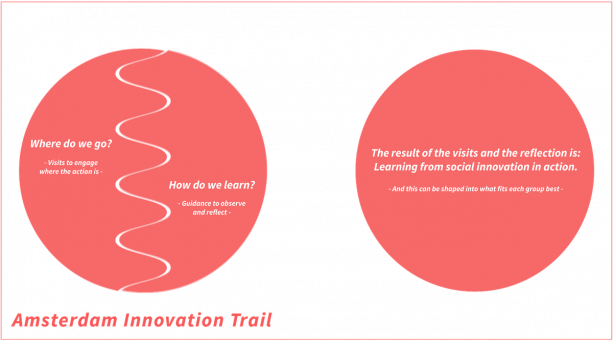
Based in a home for radical innovation Spring House, Kennisland and STBY are networked and tuned into the latest developments in (social) innovation in the Netherlands. We have a track record in creating learning environments for city makers, teachers, directors and many other players in society and industry. We combine this extensive experience with our deep understanding of dilemmas around (social) innovation internationally to create the Amsterdam Innovation Trail.
The duration of the trail can be anything from a day to five days, and topics can be thematic (health, data, smart cities, social innovation or circular economy, for instance) or process-focused (reframing, scaling, disrupting, for instance).
For more information on the possibilities of the Amsterdam Innovation Trail contact Tessa de Geus from Kennisland (<a>tg@kl.nl</a> / +31 614153916) or Shay Raviv from STBY (<a>shay@stby.eu</a> / +31 6 48579739)
Play the City: Affordable Housing Game Training
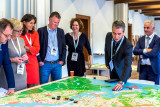
Explore housing strategies through an interactive gaming method
Learn about housing policies through the Play the City method. We welcome teams that a have a serious interest in housing affordability. In an interactive, multi-actor environment you can test your ideas, build housing scenarios and exchange knowledge with your peers.
Are you a housing provider, investor, project developer, city official or a non-profit organization? Would you like to know how Dublin and Amsterdam engage influential stakeholders in addressing their housing affordability through a city game?
City gaming is a working method that allows participants to collaborate, learn and experiment in a realistic yet safe environment. This method allows experts to step outside their usual environment to think freely about ideas and scenarios that might help overcome the barriers to providing sufficient, good quality affordable housing in their city.
There are no prescriptive scenarios or solutions. The game training serves players who, with their real-life expertise and experience, create scenarios based on tested policies. Then they assess their decision with and against other players. It is fast-paced and competitive, yet there are no winners and losers — everyone learns!
In this training, we present the Affordable Housing Game - a policy-making game for developing an implementable agenda for affordable housing across European Cities.
By learning about this method, you will:
*Enhance effective decision-making
*Learn from real world cases while networking with professionals from diverse sectors
*Learn how to adapt to and take action in multidisciplinary environments*Elaborate on the new role of government, companies and communities
*Learn about your own negotiation skills, how they are perceived by other professionals and how you can improve them
If your team is interested in playing with another team from a particular stakeholder group, we can engage actors from municipalities, city-networks, universities, companies and citizen groups to test-play with your team for more diverse knowledge-exchange.
You may choose to book:
Demo session - lasts 1.50 hours
Full training session - lasts 3 hours
More info about Play the City’s practice: www.playthecity.nl
The Affordable Housing Game is developed in collaboration with Urban Land Institute Europe.
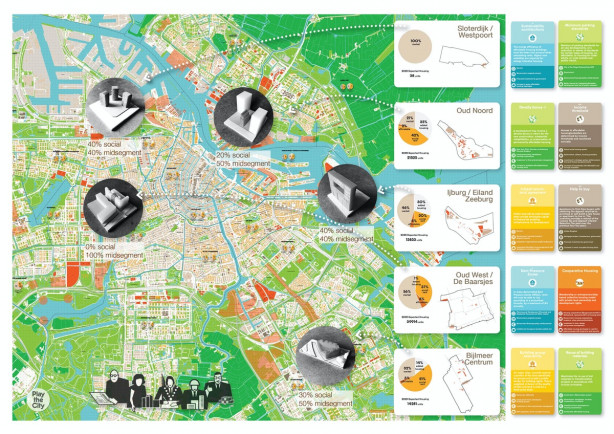
Architour
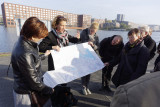
architour organizes high-quality guided tours to architecture and urbanism in the Netherlands, guided by local architects.
architour organizes programmes, tours and lectures for groups, focussing on architecture and urbanism in Amsterdam and beyond.
We offer a range of ready-to-book tours, but also develop customized programmes according to your wishes. Lectures on city development, visits with local stakeholders, tours on specific themes - everything is possible. You'll be accompanied by an expert local architect, who will give you a first-hand insight into the Dutch approach to urban issues.
B. Amsterdam Startup & Innovation Ecosystem
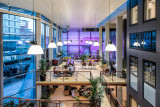
Europe's largest innovation ecosystem, focused on international scale-ups, corporate innovation and public-private partnerships to accelerate international business growth.
Do you want to learn from the largest start-up and innovation ecosystem in Europe? Make sure to visit B. Amsterdam, an innovation hub covering 40.000m2.
B. Building Business offers a tour to share insights on how government, start-ups, corporates, investors and incubators co-build this innovation- and tech ecosystem on a global scale.
Our programs focus on building a global startup ecosystem, future talent and corporate innovation. Interested? Click the link to B.visits and fill in the request form to book a tour now!
Costs for a 1 hour tour + introduction about B. Amsterdam:
Commercial group (max. 20 persons) - 300 euro (excl. VAT)
Non-commercial group (max. 20 persons) - 200 euro (excl. VAT)
*Due to high demand, we kindly ask you to share your request at least 2 weeks before your visit.
Residential Living Lab

The International Residential Living Lab (IRLL) stimulates and facilitates the founding of residential living labs. Residents test new housing solutions, components, materials, energy concepts and smart devices in collaboration with stakeholders to develop future-proof housing solutions. The IRLL has developed specialized methods and tools to co-create successful and continuous residential living labs. They cover the city of Amsterdam as other interesting sites in The Netherlands and abroad.
The tours offered differ in terms of length and content consisting of visits to sites, presentations, knowledge transfer, discussions with stakeholders and in-depth project developments. The prototype of the International Residential Living Lab has been placed on the campus of TUDelft and can be visited in combination with a special program on circular and smart urban housing. Different Residential Living Labs are under development with real life users, co-creation and data collection.
For more information or special programs get in touch with the IRLL.
Stay up to date
Get notified about new updates, opportunities or events that match your interests.

